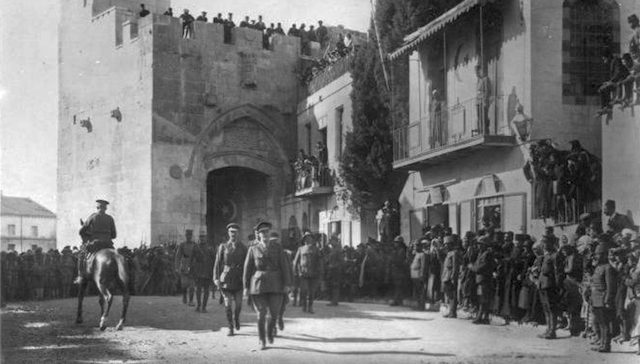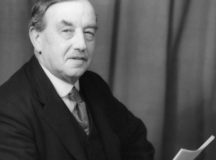Despite issuing the Balfour Declaration in 1917 and subsequently obtaining the Mandate for Palestine from the League of Nations, the British Government never clearly defined the concept of a Jewish National Home or proposed a concrete policy plan to implement it. In this essay focusing on the years following the Declaration, BICOM CEO James Sorene argues that this absence of British policy left both Jewish and Arab communities confused and frustrated and ultimately had tragic consequences.
Introduction
The Balfour Declaration was signed and delivered in London in November 1917 but the Mandate from the League of Nations did not officially begin until September 1923. The Mandate was granted to Britain with the express purpose of ‘putting into effect’ the Balfour Declaration and establishing a Jewish National Home in Palestine, but the first years of British rule amounted to an unsuccessful attempt to reframe this objective in order to meet the concerns and aspirations of the Arab population. As a result, the British government never clearly defined the concept of a Jewish National Home or proposed a concrete policy plan. Moreover, despite concluding early on that the Arabs would not compromise in accepting any kind of Jewish homeland, the British never attempted to impose a solution, preferring instead to fudge the issue and muddle through, which created the impression that British government policy was always evolving and open to amendment. The absence of a clear plan in the early years led the Arab and Jewish communities to function increasingly autonomously and incubate their conflict with tragic consequences.
1917-1920: Military administration
As the leaders of the World Zionist Organisation celebrated the Declaration, it fell immediately to British civil servants and soldiers to make it a reality on the ground. When General Edmund Allenby entered Jerusalem in late November 1917 a British military administration was established from a curious assortment of army officers and members of the British civil service based in Egypt. Yet the administration was impaired on a number of levels. Its day-to-day operation was guided by the principle of the status quo ante bellum laid down in the manual of military law which led to very little activity taking place to develop the Jewish National Home. Moreover, the British lacked trained administrators and suffered from organisational friction between competing centres of power in the Foreign Office and Colonial Office which contributed to the confusion about aims and objectives. The government produced no strategy to implement the Jewish National Home policy and the Balfour Declaration was not officially announced in Palestine as the new policy of the British government until 1920.
The military administration was plunged into crisis when a series of demonstrations in what was the first large scale Arab nationalist activity in Palestine turned violent in February, March and April 1920. The April riots coincided with the war Allies meeting in San Remo to sign a peace deal with Turkey and grant the Palestine Mandate to Britain to implement the Declaration. During the festival of Nebi Musa and Passover, Arab mobs attacked the Jewish residents of the Old City of Jerusalem. The unrest continued for four days and nine people were killed and 244 wounded. The subsequent Commission of Inquiry criticised soldiers for being slow to restore order and negligent in preventing renewed fighting. The controversy led the government to disband the military administration and appoint Sir Herbert Samuel as the first High Commissioner of a new civilian administration.
Civil administration
Samuel saw the ideal of a Jewish state as a distant dream and a long-term objective to be achieved incrementally. On a previous visit to Palestine in early 1920 he was impressed by the strength and seriousness of Arab hostility to Zionism but was convinced that the two movements could be reconciled. He wrote to Foreign Secretary Lord Curzon that his policy would be passive, to create the conditions for the Zionists to carry out their work, to facilitate immigration and leave the Zionists to their own resources (Wasserstein, 1978; 87). Samuel arrived in June 1920 and took immediate steps to implement the Jewish National Home policy. He opened the country to Jewish immigration and began an extensive road-building programme to employ some of the new arrivals. In July 1920 Samuel met Arab notables in Jerusalem and Haifa and stressed that the gradual establishment of a Jewish National Home would not affect their civil or religious rights.
When Feisal’s rule was crushed by the French in Syria, the Arab nationalists in Palestine were thrown into disarray with their original goal to unite with Syria now unattainable. In July 1920 they decided to concentrate all their efforts in Palestine. The third Palestinian Congress was held in Haifa on 13 December and the delegates elected an Arab Executive and demanded a native government elected by the pre-war Arabic speaking population. It is clear from their discussions that existing governing arrangements were seen as temporary and open to negotiation.
In February 1921, Samuel decided to reach out to the Arab Executive and met with them to discuss the draft text of the League of Nations Mandate. He asked them to accept the current draft in return for official government recognition, but they refused. The Zionists were very critical of Samuel’s reconciliation attempts in light of widespread anti-Zionist agitation by the Arab leadership.
Churchill takes charge
In early 1921 the Colonial Office took over responsibility for Palestine from the Foreign Office. Winston Churchill was Secretary of State for Colonial Affairs and the Middle East department was led by Sir John Shuckburgh with T. E Lawrence as Arab advisor and Richard Meinertzhagen as military advisor. In March, Churchill visited Palestine following his attendance at a major imperial conference on Middle East policy in Cairo where it was decided to remove a large chunk of the Palestine Mandate territory east of the Jordan River and create a new kingdom of Transjordan to be ruled by Feisal’s brother Abdullah. Churchill met the Arab Executive and was given a memorandum explaining their objections to Zionism and their demand for a native government. One section was clearly influenced by European antisemitic thought and is worth quoting at length:
The Jews have been amongst the most active advocates of destruction in many lands, especially where their influential positions have enabled them to do more harm … the defeat of Germany must also be put at their door … We have seen a book entitled ‘the Jewish Peril’ which should be read by everyone who still doubts the pernicious motives of the Jews … (Ibid., 97)
This mode of expression probably led Churchill to conclude that the Executive’s fears were driven by prejudice and misunderstanding that could be dealt with in time. A separate memorandum from the Haifa Arab delegation simply rejected outright the idea of transforming Palestine into a home for the Jews.
Churchill told the Arab Executive that the Declaration was manifestly right but he did offer an interesting perspective on Britain’s long-term strategy when he said that ‘the establishment in Palestine of a National Home for the Jews did not mean to make Palestine the National Home for the Jews’ (Porath, 1974; 96). Was this the glimmer of an idea that the Jewish National Home would only take up a portion of the Mandate area? If that was Churchill’s intention he didn’t expand on it. The idea of partitioning the land only gained momentum in 1937 after several rounds of more serious violence. At this stage Churchill and his officials talked in terms of the civil and religious rights of the Arab community, echoing the language of the Declaration, and avoiding any reference to political rights and national self-determination for the Arab community. When he met the Zionist leadership Churchill stressed the need for Arab-Jewish friendship and said that the Jewish people ‘cannot suffer the suspicion that it wishes to deny another nation its rights’. If British policymakers had a vision at all it was one of incremental Jewish immigration leading to economic growth that would help persuade the Arabs of the benefits of a Jewish National Home. Churchill left Palestine believing that Arab nationalism was not a political movement with widespread support and hoped that his reassurances assuaged Arab opposition to Zionism. On the contrary, his revised formulation about a Jewish National Home in Palestine, and not in all of Palestine, reinforced the view among the Arab leadership that nothing was set in stone and the Jewish National Home policy was still up for negotiation.
The Jaffa riots and a new policy
From 1 May and 7 May 1921 violent disturbances broke out in Jaffa and spread around the country. On 3 May Samuel reluctantly declared martial law. The nature and scale of the violence was shocking – 47 Jews and 48 Arabs killed and 146 Jews and 73 Arabs wounded. Samuel concluded that his best option was to immediately suspend Jewish immigration as a concession to Arab concerns, much to the fury of Zionist leaders who believed he was rewarding violence rather than punishing its instigators. London was unimpressed at the speed of Samuel’s reaction. One of Churchill’s senior advisors sent a telegram to Samuel on 14 May stating that ‘the present agitation is doubtless engineered in the hope of frightening us out of our Zionist policy … we must firmly maintain law and order and make concessions on their merits and not under duress’.
Samuel decided that he needed to make a public statement about British policy in Palestine in order reduce tensions. On 3 June he explicitly stated that the Declaration did not mean Jewish government and that the true meaning of the Declaration was a limited number of Jews could come to Palestine to develop it to the advantage of all its inhabitants. Samuel described his new thinking in a memo to Churchill. He believed ‘a serious attempt must be made to arrive at an understanding with the opponents of Zionist policy even at considerable sacrifices … the only alternative is a policy of coercion’. On 14 June Churchill told Parliament that ‘no Jews would be allowed into Palestine unless they could be provided for by the expanding wealth and development of the resources of the country’. This was the first time that immigration was linked to Palestine’s economy and its ability to cope with an expanding population, a principle that was developed further in the 1922 White Paper.
For the Zionist leaders these new policy pronouncements were a disaster. Zionism existed to build a Jewish homeland and provide a safe haven for Jewish refugees fleeing persecution, particularly in Eastern Europe. Free immigration was the central tenet of the Zionist programme and the British government cancelled it. The Zionists argued that the new formulation made no sense. Jewish immigrants to Palestine were provided for by the Zionist organisations and largely worked in agriculture. Rather than draining the public purse, Jewish immigration boosted the economy. In private Churchill assured Chaim Weizmann that his recent statements did not amount to a reinterpretation of the Declaration and did not exclude the possibility of an eventual Jewish majority in Palestine.
On 18 August 1921 the British cabinet discussed a memorandum from Churchill and concluded that the honour of the British government was bound up with the Declaration, yet because of it peace was impossible[1]. The result of the inconsistency was, as one cabinet minister described it, to estrange the Arabs and the Jews ‘while involving us in futile military expenditure’(Ingrams, 1972; 144). The issue of cost was bearing down on the government in light of the sizeable debts incurred during World War 1 and a vocal newspaper campaign demanding that the Britain give up the Palestine mandate and save money.
The Commission of Investigation after the May riots was published in October 1921 and concluded that the violence was caused by discontent with the government partially due to its Jewish National Home policy and partially due to an Arab misunderstanding of it and the manner in which it is interpreted and sought to be applied. The Middle East department in the Colonial Office advised that a detailed and definitive statement of government policy was crucial to allay suspicion and prevent further violence. After extensive consultations with Zionist and Arab leaders it was clear that a deadlock had been reached. The Zionists viewed the June statements as a serious erosion of the promise of the Declaration and refused to accept it. The Arab leaders were fundamentally opposed to the premise of the Declaration and large scale Jewish immigration.
The June 1922 White Paper
The Colonial office hoped that a White paper would help break the deadlock and set out future British policy in Palestine. It was built on two principles: Churchill’s comment in 1921 that not all of Palestine would become the Jewish National Home; and a limit to Jewish immigration linked to economic capacity. The document explicitly recognised the Jewish connection to the land, describing the Jewish National Home as a ‘centre for the Jewish people to take an interest and a pride’. Yet whilst the White Paper accepted that the build up of the Jewish centre would necessitate immigration, it stated that ‘this immigration cannot be so great in volume as to exceed whatever may be the economic capacity of the country’. The White Paper’s publication was followed by the formal acceptance of the writ of the British mandate by the League of Nations on 24 July. The Council of the League of Nations legally confirmed Britain as the Mandatory power for Palestine, and stated that ‘the Mandatory shall be responsible for placing the country under such political, administrative and economic conditions as will secure the establishment of the Jewish national home,’ and that ‘an appropriate Jewish agency shall be recognised as a public body for the purpose of advising and co-operating with the Administration of Palestine in such economic, social and other matters as may affect the establishment of the Jewish national home’. The Council also provided ‘recognition … to the historical connection of the Jewish people with Palestine and to the grounds for reconstituting their national home in that country’. This should have been a moment of celebration for the Zionist enterprise as the League of Nations enshrined the concept of the Jewish National Home in Palestine in international law. But they believed that the practical implementation of the policy was being scaled down with the publication of the new White Paper that did nothing to reconcile the parties. The Arabs rejected the White paper on the grounds that it recognised a Jewish historic connection to the land and endorsed further Jewish immigration. The Zionists decided to accept the White Paper grudgingly, but for their leaders this was a watershed moment that convinced them that the build up of a Jewish National Home would only come about as a result of their own initiative.
Samuel presented a number of ideas to create representative institutions for the communities in Palestine but all were rejected by the Arabs due to their fundamental objection to the purpose of the mandate. All his proposals were born of a paradox that any institution had to grant the Arabs a measure of autonomy in order to be accepted whilst not giving them the power to solve their grievances and halt the development of the Jewish National Home. The Colonial Office instructed Samuel not to repeat his attempts to create national institutions and as a result the Arab and Jewish institutions led their communities in isolation and dealt separately with the Mandate government. Samuel ended his term as High Commissioner in 1925 and remained true to his initial policy of a gradual build-up of a Jewish National Home. He privately suggested it might one day reach 40 per cent of the population. His final report to London stated that the government had not done enough to help the Zionists and that the build-up of the Jewish National Home ‘has not been the work of any government but the outcome of the energy and enterprise of the Jewish people in Palestine.’(Kedourie & Haim, 1982; 91)
Britain was stuck. Committed to the mandate and the Declaration, neither politicians nor officials could find a new way forward. There were strong strategic interests in maintaining British rule in Palestine for the long-term protection of the Empire and the country was an important part of British communication in the Middle East, integral to the defence of Suez and free shipping to India as well as an important link in air traffic to India and the East.
In 1923, Sir John Shuckburgh, head of the Colonial Office Middle East Department, confided to a colleague, ‘We saw them [Jewish and Arab leaders] separately and felt we were telling them different things … to the Arabs that the Zionist policy was not such a serious matter, that they were exaggerating its importance; to the Jews the toning down of the Balfour Declaration did not mean a diminution of their hopes.’(Friesel, 1987; 194) The result of these conflicting assurances was increased communal autonomy and polarisation between two completely different visions for the same small piece of land.
Shuckburgh’s admission is striking for its honesty and for how early in the mandate period it was expressed. The cabinet minutes and private correspondence of the leading British figures in this drama reveal that they understood as early as 1921 that the inherent contradiction of their policy would lead to conflict. Yet it took another 16 years for a concrete government proposal to partition Palestine to take shape in what was the brutal aftermath of the first wave of the Arab revolt in 1937. Did the British underestimate Arab Nationalism in Palestine or rather overstate their ability to persuade the Arab community to compromise?
The British government and the civil administration engineered a situation whereby their actions and words created the impression that the Jewish National Home policy was not fixed but constantly evolving and changing. The Arabs saw this as an opportunity, and believed that if they continued to stand firm in their resistance to Jewish immigration – rejecting a Jewish National Home and the Jewish connection to Palestine – they would ultimately prevail. The repeated restatements of British policy, including the allocation of significant territory to create Transjordan and the High Commissioner’s response to violent disturbances reinforced this view. The Zionists learnt to adapt to each twist and turn in British policy, however disappointing. Their strategic goal was Jewish self-determination and they compromised on almost every issue to achieve it, accepting partition in 1937 and 1947 while investing significant resources into training and preparing for conflict. Their reward was a partition plan approved by the UN that laid the foundation for the establishment of the State of Israel in 1948.
Bibliography
Articles
Friesel, Evyatar British Officials on the situation in Palestine, 1923, Middle Eastern Studies Vol. 23 1987 p. 194.
McTague, J.J., British Military Administration in Palestine 1917-20, Journal of Palestine Studies, 7, iii, 1978, p. 71.
Books
Almog, Shmuel, (Ed.), Zionism and the Arabs, (Jerusalem: The Historical Society of Israel and the Zalman Shazar Center), 1983.
Caplan, Neil, Palestine Jewry and the Arab Question 1917-25, (London: Frank Cass), 1978.
Gilbert, Martin, Exile and Return – The Struggle for a Jewish Homeland, (New York: First Printing), 1978.
Ingrams, Doreen, The Palestine Papers 1917-22 – Seeds of Conflict, (London: George Braziller), 1972.
Kedourie, Elie, The Chatham House Version and other Middle Eastern Studies, (London: Ivan R Dee), 1984.
Kedourie, Elie and Haim, Sylvia, Zionism and Arabism in Palestine and Israel, (London: Taylor & Francis), 1982.
Knox, Edward D., The making of a new Eastern Question, (Washington D.C.: Catholic University of America Press), 1981.
Meinerzhagen, Richard, Middle East Diary 1917-56, (London: Cresset Press), 1959.
Porath, Yehoshua, The Emergence of the Palestinian Arab National Movement 1917-29, Vol. 1, (London: Cass), 1974.
Sachar, Howard M., A History of Israel, (New York: A.A. Knopf), 1979.
Segev, Tom One Palestine Complete, (London: Little, Brown), 2000.
Wasserstein, Bernard, The British in Palestine 1917-1929, (London: B. Blackwell), 1978.
Weizmann, Chaim, Trial and Error, (London: Harper), 1949.
[1] Conclusions of a meeting of the Cabinet held at 10 Downing Street 18th August 1921, Pg. 8 point (iv) National Archives Catalogue Reference CAB/23/26 0025






































Comments are closed.